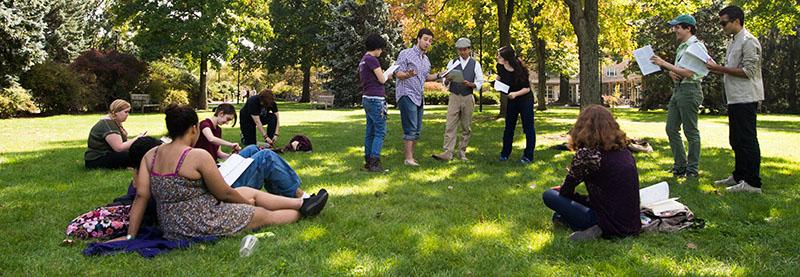Students Organize Informal Shakespeare Performance
A group of actors congregate in a round robin for an informal, spontaneous performance of Shakespeare’s A Midsummer Night’s Dream. College sophomores Jay Shapiro and Chris Puglisi organized the experimental outdoor reading that took place Saturday.
October 3, 2014
An exciting experiment in directing and acting occurred on Saturday when students met in Wilder Bowl for an open reading of Shakespeare’s A Midsummer Night’s Dream. College sophomores Jay Shapiro and Chris Puglisi proposed to direct a version of the Shakespeare play that was audition and rehearsal-free, with a single time commitment at the conclusion of last semester.
According to Shapiro, the two directors were inspired by writer and director Joss Whedon, who would host brunches with his actor friends during which they would read the works of Shakespeare. Ultimately, these impromptu performances manifested in his 2012 film adaptation of Much Ado About Nothing. Like Whedon, Shapiro and Puglisi wanted to create a relaxed environment where people could enjoy Shakespeare without the anxiety of a staged performance. The students wanted to use an informal setting to promote the notion that Shakespeare is still relevant today.
“The style of the event was not the most refined thing [and let] people go with their gut,” Shapiro said.
The play was presented round-robin style, with audience members volunteering to play a part for a particular scene and switching characters as the afternoon progressed. The theater-in-the-round style created a communal feeling but also posed difficulties for staging that a proscenium style performance would not have had; blocking theater for an audience on all sides can be a difficult task, requiring specificity that can only arise from a rehearsal. Jumping into the circle and having to read a new script while simultaneously making themselves accessible to the audience was a challenging pursuit for the actors. Staging was mainly an issue in scenes with many actors, but in more intimate scenes there was room to explore space and varied staging. The line “Masters, spread yourselves” appeared to address both the characters and the actors in a particularly meta moment.
Because of the outdoor setting, the event attracted curious passersby to both watch and participate in the activity. People were free to come and go as they pleased, keeping the cast fresh and the audience entertained.
Puglisi said being outside created a “static environment [with a] Shakespeare in the Park vibe.”
The reading began with a warm up dance to Redbone’s “Come and Get Your Love.” While the crowd was modest in size, there were still plenty of participants to dive into the first scene of the play.
For each scene, the directors provided a few basic instructions and then let the actors take over. The play begins with a fight about loyalty and love, so the actors were instructed to act like they were in a Mean Girlsstyle catfight. The two young lovers, Hermia and Lysander, were told to act like horny teenagers.
The directors wanted participants to have fun engaging with the text and purposefully gave open-ended instructions in order to give actors free rein over interpretation. College firstyear Drew Styles said that participating in A Midsummer Night’s Dream was “so much more relaxed” than his previous Shakespeare experiences.
After a while, the directors added more exciting layers into their instructions as the majority of the participants, appeared very comfortable with the Shakespearean text. In one scene, actors were asked to play with power dynamics, while others were asked to read a single line in multiple ways in order to glean different interpretations. At one point, the cast took a moment to discuss how the character Helena should be played so that she would come across as not purely desperate but also assertive.
After an audience member made a suggestion, the whole crowd joined in singing Lady Gaga’s “Poker Face” in the next scene to sing the character Titania to sleep.
The actors portraying Hermia and Lysander were later told to discuss sex in a song that is suitable for 5-year-olds. At one point when the four lovers are fighting and the men are under the spell of “love juice,” the actors playing Lysander and Demetrius were asked periodically to switch roles, and the same direction was given to the actors playing Helena and Hermia. Later, those actors swapped with the other two actors, creating an artistic chaos that echoed the emotional pandemonium of the scene.
When the crowd was small, it was hard to get a variety of actors, as participants did not want to perform multiple times. A larger audience would have been beneficial at these awkward moments. However, the intimate setting allowed the actors to experiment with different acting styles. Styles said he played Duke Theseus a year ago in high school, but this experience let him play the roles he had always wanted to try.
“The people who came were so excited about Shakespeare,” Puglisi said. Shapiro said he concurred: “It was great seeing people dive in.” Puglisi and Shapiro began a mailing list at Saturday’s reading and hope to build a base of people for new projects. They also discussed hosting an indoor round-robin reading this semester when the weather gets colder,or hosting a randomly pre-cast show from the mailing list. The students hope to draw participants who are enthusiastic about Shakespeare and eager to participate, but do not have room in their schedule for a significant commitment of time.
















